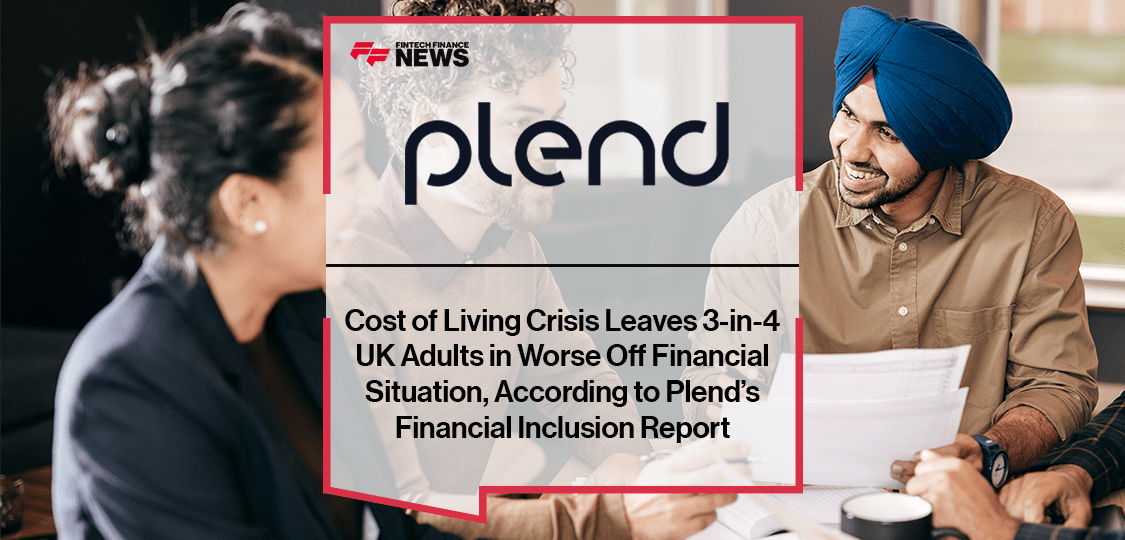Breaking News

Cost of Living Crisis Leaves 3-in-4 UK Adults in Worse Off Financial Situation, According to Plend’s Financial Inclusion Report
Households in the UK are in a worse financial position as a result of the cost of living crisis than they were during the pandemic, according to Plend’s latest Financial Inclusion Report.
Plend’s report – ‘Financial Inclusion Report: the impact of a cost of living credit crunch’ – focuses on the impact of the cost of living crisis, personal and household finances, and the resultant impacts on access to financial services in the UK. The findings emphasise how badly some groups – such as young people and ethnic minorities – have been affected more by the crisis than by the pandemic, thereby contributing to the increase in financial exclusion of those looking for support.
Ethnicity and poverty factors
The report highlights notable ethnic disparities, with over half (58%) of people from Black and minority ethnic communities borrowing money because of the financial impacts of the cost of living crisis – nearly double the proportion of white people doing the same (30%).
There are also a number of examples within the findings that highlight how the cost of living crisis has exacerbated the ‘poverty premium’, the extra costs put on those on low incomes who have to pay for essential products and services. Ethnic minority groups are less likely to be accepted for loans, with over half of those who applied (54%) rejected in the last 24 months, and those who were accepted faced higher-than-average APR rates. This is in comparison to 38% of white people who were rejected from loans in the last 24 months.
Regional disparities
The cost of living crisis has had a differential impact on regions within the UK. People in the North West have been most heavily affected, with more than 3-in-4 people (78%) saying they are in a worse financial position now than at the start of the crisis, followed closely by those in Wales (76%).
This financial vulnerability is in turn affecting people’s well-being, with over half of Londoners (58%) saying their mental or physical health has been impacted.
Lack of access to credit is high, with Scotland having the highest loan rejection rates of 2-in-3 people (66%), while a quarter of Londoners (25%) have found it difficult to access financial products.
Young adults and parents
Young people have been disproportionately affected by the cost of living crisis, as more than half of 18-34-year-olds (54%), the most of any age group, have borrowed money to ease financial pressures, in comparison to just over a third (35%) who borrowed money to offset the impact of the pandemic last year. The crisis has also had a detrimental impact on their well-being, with 2-in-3 (67%) claiming that it has affected their mental or physical health, compared to less than 3-in-10 people (29%) aged over 55.
It has additionally been found that 56% of the UK’s parents are borrowing money, in comparison to less than a third (32%) of adults without children.
Ethical and affordable lending
The cost of living crisis has highlighted issues in the access to fair and affordable credit to Britons, as the number of people who feel they are being locked out of the financial system is increasing year-on-year – up from 1-in-5 (20%) of those surveyed last year, to more than 1-in-4 (28%) this year the report suggests that those who do have access to credit are finding it difficult to pay off debt or balances, with nearly 3-in-4 (72%) people having struggled at some point to pay off their loans, up from 1-in-2 (50%) in last year’s report, suggesting that financial stability among British consumers is worsening. More than 1-in-5 (22%) people feel that they would not be able to access a credit card or loan if they needed money. As a result, 29% of those who were rejected for a loan or line of credit borrowed money from friends or family, and 10% from unregulated lenders.
This year’s report also finds that there is a lack of trust between the public and financial institutions, with only 1-in-5 (21%) credit-holding adults believing that loan and credit card companies are charging fair rates. Nearly 2-in-5 respondents (39%) agreed that if they could access a genuinely low-interest loan, their financial situation would improve; up from 27% last year.
Cutting back on sustainable living
With the end of government-led strategies and initiatives to incentivise green home improvements, the current financial climate is affecting how households in the UK are dealing with the climate crisis. This includes purchasing decisions and the ability to make environmentally sustainable choices as people are delaying home improvements. More than half the population (57%) can no longer afford sustainable products or make environmentally friendly choices.
Additionally, 4-in-5 (80%) homeowners or mortgage payers have delayed upgrading their homes to be more energy efficient, indicating the detrimental effects that the cost of living crisis is having on the decarbonisation of the residential sector.
Robert Pasco, CEO and Co-founder Plend, comments: “These findings highlight the mass inequality gaps in our society, exacerbated by the pandemic and the current cost of living crisis. Those who are already struggling to make ends meet are hit the hardest, with many being forced to turn to high-cost credit to meet their basic needs. This only perpetuates a cycle of debt and financial exclusion, trapping people in a vicious cycle they can’t escape from, contributing to the ‘Great Credit Divide’.
We must work together to prioritise financial inclusion and create a society where everyone has access to affordable credit, financial stability, and the opportunity to build a better future for themselves and their families.”
Richard Lane, Director of External Affairs at StepChange comments: “Plend’s report brings to light how the cost of living crisis has escalated ongoing issues around problem debt and financial exclusion. Struggling borrowers need the government, regulators and creditors to step up to ensure the mechanisms are in place both to catch people before they fall into long-term problem debt and to help people already facing severe financial difficulty. StepChange has supported millions of people seeking support with problem debt and continues to do so, ensuring that those who need help can access it.”
Co-founded in 2020 by Robert Pasco (CEO) and James Pursaill (CTO), Plend offers longer-term, sustainable loans at fair interest rates for borrowers that are missing out due to traditional credit scoring. Rather than the traditional system of using credit scores based on demographic data to set interest rates, Plend uses open banking to build a fairer picture of individual financial positions, known as the Plend score. Plend created the annual Financial Inclusion Report to help highlight the UK’s financial exclusion crisis and those most at risk in society.
This is Plend’s second annual Financial Inclusion Report, following last year’s which focused on the impact of the coronavirus pandemic on household and personal finances. The research was conducted by Opinium Research, with a representative sample size of over 4,500 UK adults, and Plend’s own customer data. The report also includes contributing comments from debt charity StepChange, the Green Finance Institute, Nationwide, the University of Bristol and Fair4All as well as additional reference points from the Centre for Social Justice, Fair By Design, ONS, PFRC, The FCA, The Money Charity, and World Bank.
- Visa Acceptance Platform Now Supports Tap to Pay on iPhone, Boosting Contactless Acceptance for Merchants Read more
- How Google Is Helping Fintechs Navigate Regulation and Innovation Read more
- DataHaven on What Truly Defines a Real Insurance Technology Partner Read more
- Basware Appoints New Chief Marketing Officer Read more
- How Hiring the Right Services Can Streamline Your Business Read more






















